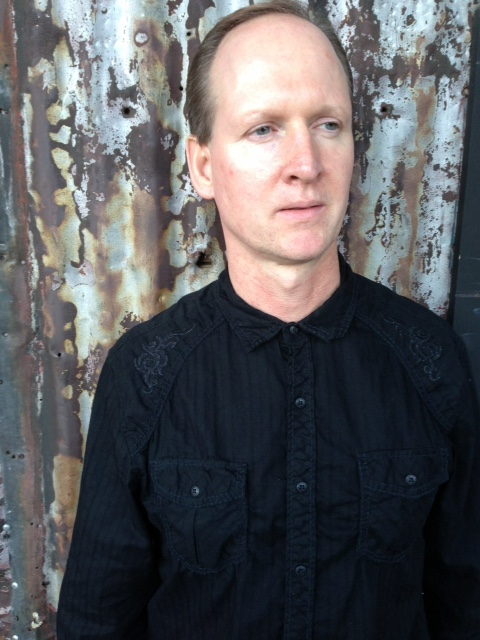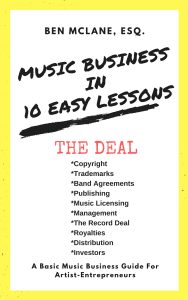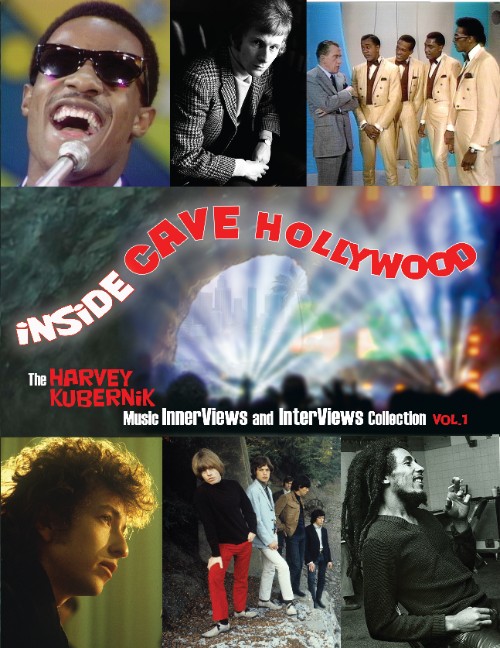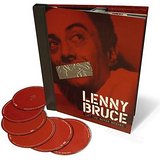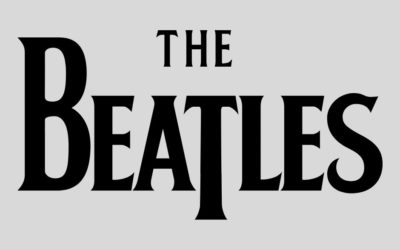Ben McLane’s New Book
By Harvey Kubernik
Attorney Ben McLane is the author of the just published Music Business in 10 Easy Lessons. It is available for purchase on Amazon at the following link. https://www.amazon.com/dp/B07B91ZZ48/ref=sr_1_1?ie=UTF8&qid=1520448664&sr=8-1&keywords=music+business+in+10+easy+lessons\
Ben McClane is interviewed by author Harvey Kubernik. 
Ben McLane is interviewed by author Harvey Kubernik.
Q: Tell me a little about your background before you entered the lawyer world, after graduating from Pepperdine Law School. Were you a record collector or in a band growing up I believe in Kansas City.
A: I essentially grew up in Derby, KS (near Wichita) from kindergarten-high school, and then went to Kansas State University for an undergraduate degree in business. I was always a music fan, weaned on 70s AM radio, and FM after. In those days there was still a lot of great 60s pop/rock music in regular rotation on the Top 40 stations (not yet relegated to oldies stations only), so I really found that I liked that sound in particular. This led me to start collecting 45s from the past and reading all I could about the history of pop/rock/soul music (which is really from Elvis era on – to me anyway), but with a focus on 1965-early 70s.
Not being a musician (or not a very good one), I became more of a music trivia nut, which none of my friends or family was into really (and none of my friends growing up were into making music, so I never joined a band or had that opportunity – everyone was more into sports and partying instead). I did take guitar and piano lessons and played in church and in the bedroom, but it never progressed beyond that. Anyway, when I was in college it hit me that I wanted to work in the music business on some level, but I did not have any friends or family to get me in or guide me, so I elected to go to law school out here on the coast (Pepperdine) thinking I could work my way in somehow with that credential.
Q: Was a career in music and entertainment law something that was part of your plan?
A: Not originally, as that is not the norm from where I came from, but as mentioned I came to some sort of realization when I was in college that perhaps I could break in/make it a career on the business side of music. My initial plan was to be an artist manager – and I did that for a while with my own company called Starkravin’ Management where I handled a few local acts, and I also worked as an intern for Tim Neece for a few years who then handled Bruce Hornsby, Rickie Lee Jones, The Posies, and Charlie Sexton (and who had managed Christopher Cross in the 80s).
However, it’s hard to pay the bills when you are working on commission only like manager’s do, and none of my management clients were making any real income, so I decided to focus on music law. Of course, the ideal avenue is to work for a big entertainment law firm or record label, but for some reason I could not seem to get hired into that type of situation. Instead, I started working at general law firms to pay the bills and simultaneously opened a post office box on Sunset Blvd. where I could accept unsolicited submissions of music (tapes in those early days), and started to hand out cards and write legal columns for local “strip” mags and going to clubs to meet up and coming bands in order to start getting some music clients. After a few years of that, I understood that in order to be successful in the entertainment business you have to do it full time, so I opened my own law office in the Valley in 1994, and have been running it ever since (now called McLane & Wong with my wife Venice Wong who is also an entertainment attorney).
Q: You must have done some clerking or apprentice work before establishing your own office. Were there some former employers that informed your vision of dealing with the various aspects of the music business?
A: I met some cool industry folks early on like Tim Neece, Bill Siddons, Patrick Rains, Richard Gottehrer, David Krebs, etc. who gave me some solid advice (mostly on the management side), and later when I started hustling full time as an attorney I ended up doing legal work for some of the old guard that were still in the business, including such colorful characters as Kim Fowley, Russ Regan, Bob Marcucci, George Tobin, Marc Gordon, Robert Fitzpatrick, Henry Marx, Wally Roker, Don Grierson, Norman Whitfield, Frankie LaRocka, Marc Gordon, etc., and was able to work with legendary artists like Dionne Warwick, Marty Balin, Stanley Clarke, Ralph Tresvant (New Edition), David Marks (Beach Boys), Al Martino, Delany Bramlett, Keith Sweat, DMX, Edgar Winter, and for the Estates of Arthur Lee/Love, Johnny Guitar Watson, and Paul Butterfield. This gave me industry knowhow that you cannot learn in a book.
I also worked in the legal department for a few years at Rhino Records where I got some great experience. Eventually, some of my new artist clients in the 90s-early 2000s started to have success on the charts, like Big Bad Voodoo Daddy, Claudia Brant, Afroman, many “Warped Tour” type pop/punk bands, and it built from there.
However, most of my practice has always involved working with newer and up and coming artists, producers and songwriters, and always will be (e.g., like Joyous Wolf [Atlantic] and Elley Duhe [RCA] who are on the verge of breaking out). Our firm also handles film and TV related talent (e.g., one of our clients Ron Stallworth wrote the book Black Klansman on which the Spike Lee hit film was based).
Q: I know you are still an active record collector and subscribe to periodicals like Goldmine magazine. Who are some of your favorite bands and/or Top 5 albums of all time?
A: There are way too many to list, but some stuff I like to listen to from the past is/are Billy Stewart, Donnie Iris, Pink, Joe Tex, Lovin’ Spoonful, Bremda & the Tabulations, Monkees, REM, The Outfield, Buckinghams, American Breed, AC/DC, Spinners, ABC, Hollies, 38 Special, Third Eye Blind, America, Wham!, Cars, Del Amitri, Free Design (more into singles than albums), and from the present many new alt-rock acts I hear on Sirius radio like Grouplove, HalfNoise, Middle Kids, Rex Orange County, Tennis, Saint Motel, Wombats, The Kooks, and Triptides.
Q: It’s not lost on me that you are very involved with current musicians and independent recording artists and unsigned bands as well as repping old school songwriters and producers. What is your initial philosophy in the first steps of being introduced to a client or when a referral comes your way?
A: New clients normally come about from referrals, but sometimes I seek things out that I hear about online or in a magazine review. My policy is to take every meeting and answer every call since I don’t want to miss out on the next Beatles.
Q: How did the emergence of the internet this century impact or inform your law business?
A:Mostly it seems everything now is done via email (and text) and the Internet has made the business more global, so I have clients all over the world, but there is also so much info and music to process (since anyone can cut a track in their bedroom and upload it to the web) it’s hard to stay on top of everything to remain one step ahead.
Q: What are your feelings about music and downloading and digital universe and is it a primary concern of you when helping nurture a musician or band?
A: Any artist these days should have a social media presence – it is good for them long-term to build a following that wants to support them, and it is expected by the industry. Unfortunately, it’s not just about the music anymore. Songs are still the most important building blocks, but one needs to also have some sort of fan base as well, and the Internet provides many platforms to establish that. When I started in the business an artist had to have a record label behind him/her to break, but now it is possible to at least start a career without that (yet eventually to blow up and be a major artist I believe record labels are still essential at some point in a career).
Q: When you lecture or do a teaching class what are some of the topics you address and what sort of questions do you get asked?
A: I have spoken at many of the big music conferences like SXSW and NAMM, and I have also taught music business/law classes at Musician’s Institute in Hollywood and Los Angeles College of Music in Pasadena (where I still teach part of the year). I try to convey to students the basics of the industry – like copyrights, trademarks, working with managers, record labels, publishers, contracts, etc. Questions are all over the map depending on the audience. I try to stay as informed as possible by reading Billboard every week and other industry blogs and books.
 Q: Why did you decide to write your book? Did you feel a book of lessons was the path to go?
Q: Why did you decide to write your book? Did you feel a book of lessons was the path to go?
A: I started to see a pattern in the basic things an entry level person or artist would need to know to survive in the business, so I narrowed that down to 10 things and put them my book Music Business in 10 Easy Lessons, which is essentially a handbook with simple explanations to let someone get a good handle on how it all works, without getting bogged down with a lot of minutiae.
Q: The title of the book is a guide for entrepreneurs and artists.
A: That is essentially who it is written for, but anyone with an interest in the music business will learn something valuable at an affordable price – you get all my 25+ years experience distilled down to the bare necessities. Hopefully this helps sets my book apart from some others that may be out there.
Q: Did you feel the new musician and the veteran needed to know and learn about core concerns relating to music and income streams?
A: Yes sir – it’s all about the money or what is the point? We all need to be educated to know the new and old sources of royalties and the new and old ways to collect them so one can get everything he/she is entitled (i.e., artist and heirs). Digital is the future so that is the focus now really.
Q: Did you write this over a period of time?
A: It came from an elongated interview based on an outline I plotted out and was transcribed and edited from there, with the help of my publisher Robe Williams and his company Artist Head.
Q: You book is very direct in addressing and explaining topics that are part of the daily musician and recording artist life. Let’s go over some of them: How did you form your chapters on Copyright?
A: The business is based on songs and songs are copyrights, so I wanted to make sure readers understood the two main copyrights on a record (i.e., in the composition and the master).
Q: Trademarks are a chapter
A trademark is the rights to a name or brand/logo (think Nike), but a band name and logo like AC/DC and KISS are trademarks (which is different from a copyright). Owning and protecting one’s brand is very important as all income streams from entertainment arise from that.
Q: Publishing is a principal section you detail.
A: Music publishing really means owning the copyrights to one’s compositions. Many times a writer will do a publishing deal with a company like Sony or Universal to take care of the exploitation and collection on those works (so the publishing rights will be split with that company).
Q: Music Licensing is implemented.
A: For many of my clients this is their key form of income – having their music placed in film, TV, commercials and video games. A license can create upfront fees and back end performance royalties (i.e., BMI or ASCAP) once the song airs on the program.
Q: You book also brings us into the world of Band Agreements. What has changed in this arena the last 25 years since you’ve been in the music and law arena?
A: I do not think there have been any significant changes. When a band forms it is a partnership and the members jointly own the band name, the copyrights created by the band, and the income from exploitation of the band’s entertainment services, so it’s important to know how those things will be split internally and what happens if the band breaks up or someone quits or is fired.
Q: And then there’s management. I suspect you have been on both sides of the ledger.
A: I represent both artists and managers. Artists will want a shorter term and to pay the manager a lower commission and the manger wants just the opposite. Like most deals, parties usually end up meeting in the middle (unless one has more leverage).
Q: And Management. Have you ever managed an act? What general advice can you give to both Manager and Artist?
A: Yes when I started in the business as mentioned I wanted to be a manager and I was a manager. I did learn a lot how the business works because a manager wears a lot of hats, but I found it’s hard to make money as a manger unless you have a big act or acts that are earning from sales and touring. My advice to young managers is to try to join a larger manager company like Red Light or Azoff to learn the ropes and use their resources, and it’s probably wise to manage more than one act so you do not put all your eggs in one basket as the artist might leave you or quit the business.
Q: The coveted Record Deal, Royalties and Distribution are also examined.
A: I have found that most artists still want – and probably need – a record deal to blow up and have a big and long-lasting career. However, you have to give to get, and things like the term of the deal and the royalty rate are key negotiable items in a record deal.
Q: You also devote some text about collaborating with Investors
A: Since it’s hard for a new artist (or artists in some niche genres or who are older) to secure a record deal, getting an investor to fill the monetary gap that a label would provide so the artist has money for marketing, promotion and recording is the purposes of this chapter. It goes over what an artist should offer an investor, etc. (but the talent should always try to maintain creative control).
Q: What sort of trends have you noticed this past decade that will continue and in a general statement what are some key slogans or subject specific advice you would give to the young musician?
A: Some primary trends I notice are everything going digital (via cell phones), global artists, and singles (not albums).
Q: And we also have a world now where people are involved with music that have never played an instrument or been in a recording studio. But seem to acquire or be rights owners in the field of catalogs.
A: Those to me this sounds like big music fans, or someone who sees music as a form of investment to make money. In order to get rich in this business you either write hit songs or own pieces of hit songs.
For more information see benmclane.com
Harvey Kubernik is an author of 15 books. His literary and music anthology Inside Cave Hollywood: The Harvey Kubernik Music InnerViews and InterViews Collection Vol. 1, was published in December 2017, by Cave Hollywood. Kubernik’s The Doors Summer’s Gone was published by Other World Cottage Industries in February 2018. \
Harey’s The Doors: Summer’s Gone has been nominated for the 2019 Association for Recorded Sound Collections Awards for Excellence in Historical Recorded Sound Research.
During December 2018, Sterling/Barnes and Noble published Harvey Kubernik and Kenneth Kubernik’s The Story of The Band From Big Pink to the Last Waltz.
This century Harvey Kubernik penned the liner note booklets to the CD re-releases of Carole King’s Tapestry, Elvis Presley The ’68 Comeback Special, The Ramones’ End of the Century and Allen Ginsberg’s Kaddish.

